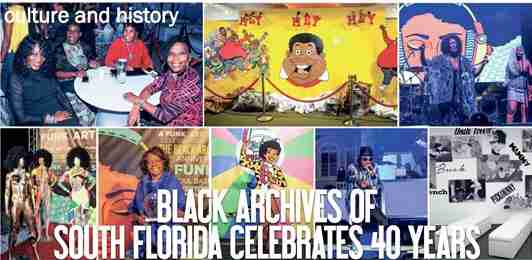The Black Archives celebrated its 40th Anniversary in grand style.
PHOTOS BY KEVIN HICKS OF SOUTH FLORIDA TIMES
Staff Report
MIAMI – With so much black history being either whitewashed, forgotten or recorded inaccurately, it is critical that blacks are writers and stewards of their own stories; and that is exactly what the Black Archives History and Research Foundation has been doing for 40 years.
On Wednesday, Dec. 6, the premier arbiter of south Florida’s Black History marked their 40th anniversary with an epic kick-off to its funk, art and soul weekend entitled “Funky Turns 40!”
Hosted by comedic great Rickey Smiley, the celebration was hosted at the organization’s headquarters, the historic Lyric Theater Cultural Arts Complex in Historic Overtown.
The evening featured complimentary valet and red carpet service, beautiful décor, an open bar with passed hors d’oeuvres, a cigar lounge, delicious food stations with dishes like loaded potatoes, chicken and waffles, pasta, paella, peach cobbler, etc. and music by the incomparable SOS Band.
Several Miami icons were honored for their service to the community during the Inaugural Black Archives Honor Awards Presentation. They included: City of Miami Commission Chair Keon Hardemon and Miami-Dade County Commission Vice-Chairwoman Audrey M. Edmonson (Community Development); Russell Benford, Vice President of Government relations America for Royal Caribbean Cruises Ltd. and former Miami-Dade County Deputy Mayor (Civic Engagement); trailblazing rapper and businessman Luther Campbell aka Uncle Luke (Entrepreneurship); Black Tech and Code Fever co-founder Felecia Hatcher (Innovation); and Miami Times Publisher Emeritus Garth Reeves Sr. on behalf of his parents Henry E.S. Reeves and Rachel Jane Cooper Reeves (Legacy).
Black Archives founder Dr. Dorothy Jenkins Fields was also presented with the Visionary Award in honor of her community foresight to preserve black history.
The highlight of the celebration was the unveiling of the new exhibition “Funky Turns 40: Black Character Revolution,” which showcases cartoons and animated images of African Americans from the 1960s and 1970s. More than 300 pieces of animation art depicted black characters that were once staples on Saturday mornings, after school and in theaters.
Guests reminisced and sang along with jingles from cartoons like “Fat Albert and the Cosby Kids” and Verb from “School House Rock.” The exhibit features original drawings and production cell classics like: “The Jackson Five,” “I Am the Greatest: The Adventures of Muhammad Ali,” “The Brown Hornet,” Lt. Uhura from “Star Trek: The Animated Series,” “Josie and the Pussycats,” black superheroine Astrea from “Space Sentinels” and so much more. It will be on display through February 2018.
The celebration continued Thursday with live shows from hip-hop’s premier beat-boxer Doug E. Fresh and the Sugar Hill Gang and closed out Friday with Hardemon’s “Art of Conversation” event that included a screening of the season two premiere of the hit web series “Giants” and music by Kid Capri.
Timothy A. Barber, executive director of the Black Archives, said Fields’ vision has evolved into a community staple.
“For 40 years, the Black Archives has been preserving the rich history and culture of Black Miami. Before Dr. Dorothy fields founded our organization, our history was scattered among the homes of pioneer families, and thought to be nonexistent by those outside of the black community,” Barber said. “It is because of the Black Archives, that children have a place to come and learn about local trailblazers and the people of color who built the city that they know today. The Black Archives Historic Lyric Theater has played a major role in the revitalization of the Historic Overtown community, through programming and employment training, reemerging in its role as a Mecca for arts and culture in the neighborhood.”
Barber said he looks forward to continuing the work for years to come.
“Looking ahead, we aim to continue to lead in historic preservation, educational programming and job training. We hope to continue to raise our profile and garner the financial support needed to continue for 40 more years and beyond,” Barber said.












No Comment